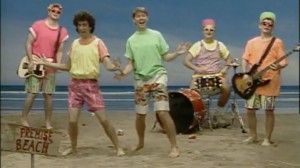If this were an “inside baseball” examination of plays I have worked on, the actual performances, this would be when the story gets dark. This would be when my first theatre company split in two, like the Mystics and the Skeksis in Dark Crystal. Fortunately it is not. Just talkin’ about the scripts. So, without further ado (my stores of ado are low today anyhow) here’s Pride and Prima Donnas.
What’s it about?
Okay. New leaf here. No angels, demons, or shadow governments. Just normal people with normal people problems. Shouldn’t need Premise Beach at all.
Director David Locke has returned to his home town after a stint in New York, and is back working for his old theatre company alongside his producer friend Jacob Garrison. For David’s first show back, Jacob’s picked out something special… Dance Into the Fire: The Duran Duran Rock Opera.

So close. I was so close. But, since we’re here… Doctor Simon Duran builds himself a love android, Electric Barbarella, but then falls for Rio, who he sees dancing on the sand. In a fit of jealously, Electric Barbarella kills Rio, then Duran, then herself. A tragic love story set to synth-pop hits of the early 80s. What’s not to like?
Anyhoo, before long David’s been introduced to his crew, stage manager and loyal soldier Caitlin Markov and tech director Ted O’Shea, and has to assemble his cast. As Doctor Duran, Monroe Morrison, veteran of the dinner theatre circuit prone to clowning around and ad-libbing. As the Baladeer, arrogant Method actor Shane Thompson. As Rio, former chorus girl Lena. And as the android, Tiffany Neuworth, whose bubbly, cheerful, seemingly airheaded exterior masks the fact that she’s a gifted performer and possibly the smartest person in the company. It doesn’t take long for the cracks to form.
Shane and Monroe hate each other immediately as their acting styles mix like cheese and diesel. Jacob is trying everything he can to get in bed with Tiffany, or at least get her naked on stage. Lena and Ted start an affair that quickly turns sour. And David has difficulty masking his contempt for the show and everyone in it. Well, except Caitlin and Tiffany. Tensions build to a head as rehearsals continue.
So why’d that happen?
David Locke was my first spin at an archetype I’d play with a couple more times over the next few years: the guy who thinks he’s smarter than everyone else and expresses that through hopefully amusing angry rants. I’ll cover why I gave that up later, but at the time, David served as a vehicle to satirize the theatrical process.
Write what you know, they say, and theatre was what I knew, what I’d known for nearly all of the 90s. I’d seen shows threatened when the lead actors broke up, last minute recasts, successes and failures of differing acting techniques, and the beautiful miracle of a cast coming together and making something wonderful. So I decided to try writing about it.
As to the show within the show. My musical upbringing was… difficult. I missed out on the popular music of my youth as my parents were trying to raise me on country and folk music. My rehabilitation was… difficult, and involved some regrettable choices in the late 80s, but the point is that I didn’t actually get into the pop music of my youth until university. Toto, Soft Cell, Thomas Dolby, maybe I’d heard them here and there back in the day, but they were all like new discoveries. And my favourite? Duran Duran. So I conceived a musical based around their hits to serve as the backdrop for the script.
How’d it turn out?
This is another script that’s been put up a couple of times. As such, it’s had some revisions, but unlike Apocalypse it was ultimately a case of adding rather than cutting or replacing. Additional moments to further flesh out the cast and crew. Additional chaos to the end of act one, where everything truly begins to collapse. The scene had opened with four simultaneous arguments, each taking turns playing out, a device better suited to television or movies, something where cuts and edits can happen, rather than stage, where people have to stand awkwardly until it’s their turn to talk again. So I blended the dialogue together, making them all flow into each other. Much better effect, but way harder on the cast. Which one day I might be persuaded to care about.
Ultimately I think it works well. It’s not a full on farce; too many breaks in the pacing, especially with the new material. In order to fully explore the characters I needed to take the occasional breather from rehearsal antics and just let the cast talk to each other. And, reading it now, those are some of the better scenes, so trying to push it to full farce would be a disservice. It’s the moments when David stops yelling at his cast and starts being a person, revealing his passion for theatre, that the audience gets any investment in Dance Into the Fire being a success. And without that I’d just be wasting everyone’s time.
So by and large I’d still call it a success, but there is one detail, one flaw I refused to see throughout both productions. For the climax, I included a montage of scenes from the musical to show that they’ve pulled off the show. Various people suggested cutting it over the years. I didn’t listen. It didn’t help that one of the primary voices suggesting the sequence be cut had a tendency to equate “simpler” with “better,” the same logic that led to a blown sight gag when I directed Two Guys the season Pride was remounted. After letting that logic screw up the horde of ninjas, I was in no mood to hear anything remotely similar to “don’t do it, because it might be hard.”
In addition, one other factor drove me to include the scenes from the play. In Kevin Smith’s film Jersey Girl, Ben Affleck steps forward at a town hall meeting to deliver an impassioned speech to the townsfolk. As he starts talking, his voice fades out and the music swells up, and his big speech is not heard, but simply implied in the reactions of the crowd. Which to me felt like cheating. Cheating, and a little bit of cowardice. I was convinced that to make a show about a Duran Duran rock opera and never show any of it was like doing a Star Trek movie with no spaceships in it. However, after the second run was complete, another writer friend, whose first novel is great and available for purchase right this second, explained my error.
In the end, the show goes spectacularly. So everyone claims as they rush off stage to the sound of applause. By deciding to show clips from the play, I put the responsibility of earning that conclusion on the show’s cast. In short, the selected scenes actually have to be spectacular or the entire ending feels hollow. Whereas if we don’t see the actual production, it can be every bit as amazing as the audience can imagine. So, yeah… the smart thing would have been to use cheering and applause as a sound cue, and let the assume assume it all worked out.
Would you stage it again?
Probably, yeah. I’d revisit David’s dialogue a bit. If he must be angrily ranting at the cast the whole time, I’m convinced it can be better. And I’d take all the scenes from the show within the show and scatter them throughout the rehearsals. That way, we still get to see bits of the show, avoiding that feeling of copping out on the premise, but still leaving the final product up to the audience’s imaginations.
Overall though, I’m still fairly happy with it, and it’s part of a cycle of connected plays that starts with Two Guys and continues through two more scripts we’ll be talking about down the road, all sharing characters who are part of the theatre group staging Dance Into the Fire.
This show also tends to spark interest in seeing the rock opera itself. I’ve never given it a whirl, but that has less to do in my interest in writing the show and way more to do with my interest in not getting sued by Simon Le Bon. If I thought there were a way to stage it with the blessing of the band (and their label, who likely hold more sway over the song rights), I might go for it, as I do have a vision of how it might go. The actress who played Caitlin (both times) had a different vision, and took a shot at getting the rights to make it, but it proved a stickier wicket than she’d hoped. I think she used an internet site to apply for the rights to use the necessary Duran Duran songs, but got told that the rights to the works of Queen were unavailable. An answer that’s like the movie Tree of Life: confusing and of no use to anyone.
Repeated Theme Alerts
- “Man and Woman Can Never Be Friends.” It’s not enough for David to respect Caitlin professionally, he has to ask her out in the end. She says no. He takes it well.
- “Plays about plays.” The second time this trope reared its head, and the only time where none of the characters are writers. I can only assume it’s because in 1999 I hadn’t yet become a devotee of Aaron Sorkin and his fondness for writing about writers.
Next time in this series… the superhero/supervillain period. It starts better than you’d think.
